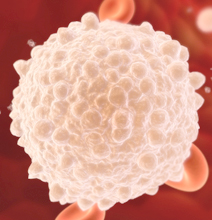Cancer vaccines
The immune system is programmed to defend the body, while also being programmed to not attack it. Because cancer cells derive from our own cells, many times they are not seen as a threat. To complicate things further, some cancers can actively suppress the immune response.
Cancer vaccines are an answer to this problem; unlike other therapies, they do not act on the cancer cells but the immune system. Their purpose is to boost the response against disease by helping immune cells – such as NK cells – to recognize and destroy cancer.
Despite the name, these are not conventional vaccines, because they do not prevent disease, but boost an attack that is already in progress.

Cancer vaccines can be produced from:
a) Neutralized (so unable to cause disease) tumor samples
b) Molecules present in the cancer cells (cancer antigens);
c) Immune cells from the patient that can trigger a (cancer) immune response;
d) Other strategies.
Examples of cancer vaccines
The first cancer vaccine, called Sipuleucel-T (Provenge®), was approved by the FDA in 2010. It treats prostate cancers by stimulating an immunoresponse against a protein present in the cancer cells of most patients. Clinical trials have shown that in advanced stage cancer it extends life expectancy for 4 to 20 month , and reduces death by about 20%.
In 2015, the FDA approved talimogene laherparepvec (T-VEC, or Imlygic®), a cancer vaccine where a modified oncolytic virus – a virus that preferentially infects and kills cancer cells – is used to treat patients with metastatic melanomas that cannot be removed surgically. T-VEC is injected into the tumor, infecting and destroying the cancer cells while also triggering an immune response against the cancer.
Recent studies suggest that is possible to develop more effective cancer vaccines by using mutated proteins that are present in the patient’s tumors. Although several small studies have shown promising results with this approach, it is too early to know if these vaccines can extend the lives of cancer patients.
At the moment, there are no vaccines for colorectal cancer, but there are ongoing clinical trials – ask your doctor more about what is happening in the field.
DNA Vaccines
Another possible vaccine strategy is to inject patients with genetic material (DNA) from cancer cells. The injection is done so that cancer DNA is inserted into the DNA of normal cells. Since DNA is, basically, a set of instructions to produce proteins – more details here – the injected cells will start manufacturing cancer proteins together with their own.
The idea is that these tumoral proteins, without contributing to disease, can stimulate an immune response strong enough to attack the whole tumor.
Clinical trials are already in progress for DNA vaccines targeting a variety of cancers, including breast cancer, human papillomavirus (HPV)-related cancers, prostate cancer, and melanoma.
A significant advantage of DNA vaccines is that they are well tolerated with no significant adverse effects, and cheap to make. The problem is that it is challenging to create an effective one.
An exception is mammaglobin-A, a protein produced in high quantities by most breast cancers from early to metastatic - but present in minimal amounts or even absent in normal tissues. Mammaglobin-A is also very good triggering an immune response, making it ideal for a vaccine.




